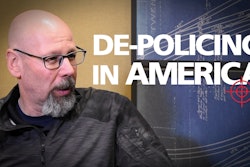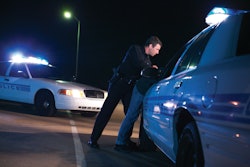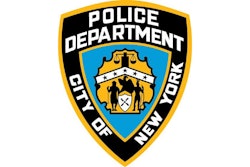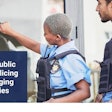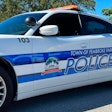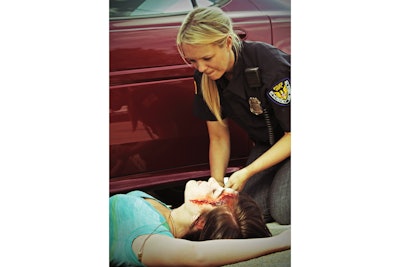 Officers often offer soothing words to critically injured victims telling them they're going to make it when they know they're most likely breathing their last breaths.Photo: gettyimages.com/ RobMattingley
Officers often offer soothing words to critically injured victims telling them they're going to make it when they know they're most likely breathing their last breaths.Photo: gettyimages.com/ RobMattingley
Law enforcement officers are sworn to uphold the law and tell the truth in their reports, to their superiors, and on the witness stand. It's what separates us from other professions where people offer up many different versions of their own truths. But think about where it may be necessary—for officer safety reasons—and useful—to get compliance or valuable information from other people—to tell what can be defined as little law enforcement lies.
Various dictionaries define what is often called a "white lie" as "a lie about a small or unimportant matter that someone tells to avoid hurting another person." Examples include, "I stayed on my diet the whole week you were out of town, honey" and "Yes, the Tooth Fairy will leave some money for you if you put your baby tooth under your pillow and go right to sleep." The difference between those little white lies and the little law enforcement lies cops tell is that ours may actually be pretty big and critically important, involving people's lives, freedom, or their future. They are not to be tossed about shotgun-style, but used like a rifle shot, in just the right situations.
When to Lie
The courts have told us that cops can lie to crooks. If you want to do a knock and talk at a house or apartment and you say, "Pizza delivery!" as you bang on the door and the bad guy opens it expecting his pepperoni pie, well, too bad for him.
We use little law enforcement lies as a tool of compassion and humanity at what could be the end of a person's life. We may say something comforting to badly injured people who lie crumpled and broken on a gurney or in the street after they have been in what soon appears to be a fatal car accident or an about-to-die shooting. "Hang in there! You're gonna make it! Just stay with me until we get to the hospital. The doctors will fix you right up." Saying anything else would be cruel.
Detectives in an interrogation room have said to the multiple-victim molestation suspect or the series rape suspect, "I can certainly see how you'd be attracted to that type of kid or woman. Tell me what was going through your mind." Building rapport with horrible monsters through little law enforcement lies is a necessary and unpleasant part of that type of questioning.
As they walk up to a car on a traffic stop while working alone at night, some officers will say, "Cover me on your side" to their "Phantom Partner" who is not actually there. There are cops, I've been told, who take this concept and stretch it into their "Phantom K-9" partner, complete with accompanying barking dog sounds to really sell it as they approach a car full of 3Ps (Potentially Problematic People). "Wow. My dog seems really upset tonight. I'm gonna need to go back there and calm him down. Can I see your license, registration, and proof of insurance, please?"
Let's say you and several other officers get into a foot pursuit at night with a suspect and it ends up in a canyon or forest or other densely covered area. If you lose sight of the bad guy, you could say to your cover officers in your loudest tone, "It looks like we lost him. He must have gotten away! Let's clear out and go back to look for him at the crime scene." Then, of course, you hide yourselves away and wait for the suspect to come crawling out of the bushes and get pinched.
We see examples in the field (and often on TV cop shows and movies) where officers have been creative and clever after giving the suspect the required Miranda warning. They'll say, "Your partner just gave you up and told us you were the one who planned the robbery" or "We already found your fingerprints on the gun, so we know it's yours." These can lead to blurted out confessions that really irritate defense attorneys—which is all the more reason to do them legally and carefully—because it proves their clients are too dumb to know when to shut up and ask for a lawyer.
 It's important to know when it's OK to lie and when it's not.Photo: Pixabay.com/ Vitabello
It's important to know when it's OK to lie and when it's not.Photo: Pixabay.com/ Vitabello
How to Lie
To use little law enforcement lies legally and effectively, follow these tips.
• Tell your partners in advance what you plan to say.
• Little law enforcement lies fail when your partner corrects you in front of the suspect, like, "No, that's not true. All the prints on his gun were smudges." Get on the same page.
Also, don't overdo it.
These linguistically creative approaches to police work, using carefully modified versions of the real truth, are not to be wasted. It's like a fine liqueur that needs to be sipped and not guzzled. Don't become a chronic liar and get a reputation for being untrustworthy in your community.
When Not to Lie
Don't lie if it breaks the law, violates your agency policy, or is unethical.
Telling an in-custody crook that you're going to let him go or "put in a good word with the DA" if he tells you what he and his pals did is a good example of all three. Just don't do it. Never "test a lie" on the witness stand, no matter how badly you want your side to win. Law enforcement officers must have integrity.
One little law enforcement lie we need to stop saying is the version where we tell citizens who have been crime victims that we will "have a car in the area" or "have this guy in custody by sundown" or "get the people who vandalized your business" if that's not actually true. Don't over-promise and then under-perform. Be realistic and honest with citizens about your potential to fix the problems they called you about.
Steve Albrecht worked for the San Diego Police Department for 15 years. His 21 books include Albrecht on Guns; Albrecht and Farrow on Guns; Patrol Cop, Contact and Cover, and Tactical Perfection for Street Cops. He can be reached at DrSteve@DrSteveAlbrecht.com.




